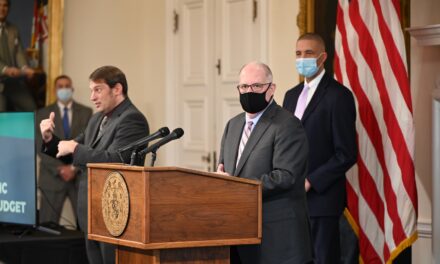By Megan Poinski
Megan@MarylandReporter.com
State prison officials Tuesday told legislators reviewing a very negative audit of their Baltimore Region financial operations that personnel problems helped cause large gaps in financial accountability, but they were making changes.
“Looking at this audit, it’s horrendous some of those things that occurred,” said Gary Maynard, secretary of Public Safety and Correctional Services. “But I think those things will be of the past and we will move forward,” because the unit had been reorganized.
The legislative auditors found an “almost complete lack of control and accountability” for the corrections region’s working funds, uncovering included thousands of dollars in penalties for bounced checks, checking accounts out of balance by hundreds of thousands of dollars, and checks machine-signed by people who no longer worked at the department. Auditors have referred their findings to the Attorney General’s Office for potential criminal charges.
Del. Steven DeBoy Jr., House chairman of the Joint Audit Committee, wasn’t satisfied with the department’s response. He said that staffing changes may be doing some good, but the bigger issue seemed to be ignored.
“What’s getting lost in all of this is there’s criminal stuff here. That’s what bothers me,” said DeBoy, a retired Baltimore County cop. “If we have people in the Baltimore region stealing money, I have a problem with that. When we start referring stuff to the AG’s office for investigation, the hair on the back of my neck starts standing up.”
“I don’t think that’s a personnel issue and we need to get more people. If we have people stealing, we need to get them out of state service.”
Maynard and Corrections Commissioner J. Michael Stouffer said that they had been aware of severe problems with financial controls in the Baltimore region even before the audit was done. Stouffer said there were problems with policies and procedures, which led to a widespread lack of accountability. There were also significant problems recruiting and retaining people, meaning it took some time to put any organization-wide changes in place.
Ultimately, the department removed the financial management arm of the Baltimore region, which includes the Supermax in Baltimore, and combined it with its counterpart in the Jessup Region. The now-larger Jessup-based office, which also had two other smaller regions folded in, now employs 85 people and handles the financial issues of the wider area.
“Generally speaking, we tried to remove the issues of complacency with staff there, and increase accountability,” Stouffer said. “We standardized operations, and there were some results there.”
The audit found that the region’s two working funds – a general working fund for office uses and an inmate working fund made up of inmates’ money — did not have adequate controls. Balances were not reconciled – and money was found to be missing – checking accounts were routinely overdrawn, and open access to checks and the signature plate led to some questionable withdrawals.
Stouffer said that there have been five people involved in some of the questionable activity who have been disciplined. More problems have gone unpunished because those employees quit before anything could happen.
Committee members talked about different options to improve accountability in the Baltimore region. One suggestion discussed was changing policy so that withdrawals from the inmate working fund need the approval of the comptroller. For the last few comptrollers, DeBoy said, the policy has been to allow withdrawals, especially because the amount taken out was usually a small amount of cash for inmates. However, the General Assembly can change that.
Sen. Verna Jones, D-Balto. City, the Senate chair of Joint Audit, asked Maynard and Stouffer to present them with a progress report by the end of January, as well as a more detailed report before the budget process.
MVA
Committee members also heard about an audit of the Motor Vehicle Administration that was released last month. The audit found that the MVA failure to review records left some drivers on the road who should have had their licenses suspended, and had problems with control of sensitive data.
MVA Administrator John Kuo and members of his top management team said that many of the problems brought up in the audit were on their way to being fixed.
A computer glitch that allowed some people who should have had their driver’s licenses suspended to stay on the road has been fixed, and a new system to automatically double-check penalties on licenses is being written. A supervisor must now approve any overrides of a driver failing the ignition interlock program. Additionally, sensitive information that was not well encrypted – the result of a switch from a third-party contractor to in-house management – is now protected, they said.





Recent Comments